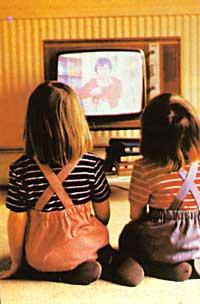Childhood, adolescence and television

In 1984, on behalf of the American Pediatric Academy, a commission published a broad report. After a serious reflection, pediatricians and parents were informed of the influence of television in the promotion of aggressive behaviors and obesity. Televisions in early sexual activity, use and abuse of drugs and alcohol, school performance and ethnic stereotypes (contempt for certain races, p. (ex.) This report also mentioned its possible incidence in the subsistence ring. Unfortunately since then, I would like to explain to readers of the magazine “Elhuyar” the review that the Academy has recently published if the problem has worsened instead of doing better.
In 1989, on average, a child from the USA spent more time watching television than in any other activity, with the exception of the latest data from Nielsen Company, Nielsen Company, children from 2 to 5 years were watching television for 25 hours a week, children from 6 to 11 more than 22 hours and those from 12 to 17 years dedicated 23 hours to television. Despite the hours less dedicated to commercial television, the latest estimates do not take into account the time of use of video. Therefore, it should be assumed that the time elapsed in the last 6–7 years in front of the television apparatus has not dropped significantly.
The influence of television on children depends on the time dedicated to it and the cumulative effect of what is seen, since it is not the same the impact of all programs (documentaries, animated images, telefilms, sporting events, etc. ). ). Who controls programming? Who determines the “sanitary” quality of the ETB series or animated images? Do those responsible for our bird take into account these criteria?
When today's child becomes a 70-year-old, he will be about seven years old watching television. Therefore, television can have more influence than the most active experience in the world, until it can move it. For some children, the world that appears or is shown on television becomes a real or unique world.
Six years after the publication of the recommendation mentioned in a beginning, the data collected in this period allow us to conclude that one of the causes of violent, violent or violent behavior, despite not being the only one, is the large amount of television. And television is also evident that the viewer helps to make obesity appear.

While there is no proven relationship between watching TV and sexual activity or alcohol consumption, it is true that on television the teenagers of the USA (and we here only see the beginning, even a little later) receive numerous sexual references and concotations (in one year they have estimated more than 14,000, while around 150 refer to sexual responsibility, abstinence or contraception). And it is true that the incidence of pregnancies and sexually transmitted diseases has increased among adolescents and that the prevalence of alcohol-related deaths in the United States is one of the main causes of disease, injury, and death among adolescents and young adults.
For all this, the Media Commission of the American Pediatric Academy has published the following recommendations:
- Efforts to demonstrate the impact of television should be strengthened between pediatrician and parents. What's more, new initiatives should be promoted to encourage parenting and the ability to criticize television among children. Pediatricians should recommend to parents to limit the hours their children spend watching television for one or two days. On the part of parents, doctors should help develop suitable alternatives to television: reading, sports and physical training, and educational diversions. The whole family has to participate in the programs their children see. Parents have to watch TV with their children to help them interpret what they “see”. To the extent possible, the appropriate options offered in the magnetoscopic tapes (videos) should be used for children and adolescents to see them. Pediatricians should apply for legislation requiring high-quality programming for children (along with other stakeholders: parents, educators, etc. ), so that at least an hour a day is composed of a program suitable for children (educator, friendly). These programs should not be based on toys, since they are aimed at selling toys to children. Pediatricians must continue to demand and demand that sexuality appear and be manifested in a responsible and adequate way in the media. Pediatricians will participate in the elimination of alcohol ads from television. The American Pediatric Academy should promote more research to measure the impact of television on children and try to check and improve the television dedicated to children.
TIPS FOR USING TELEVISION
- Check the programming before turning on the device.
- Do not place less than a meter and a half away from the television, depending on the size of the device.
- Although the radiation dose is practically zero, it is not advisable to touch the screen.
- Do not use TVs in poor condition or very worn gadgets.
- Do not watch TV in the dark.
- If you want to listen keep the TV in the volume that requires to be attentive, not stronger.
- Don't spend too many hours in front of the TV. The proper dose can be two hours a day, although occasionally a “binge” is accepted.
- Choose only the most appropriate programs depending on the age and common sense of the child.
- And finally, keep in mind that for the child the television is not a toy or an educator. “What to see, learn” says the proverb. Therefore, while no alternative is offered it is useless to say to the child “With so much tele you are going to tone…”, “The intelligence is going to dry you”, “If you follow like this, the eyes are going to become squares…”. If the child is proposed to go to the zoo to paint with him (or play together with his favorite toy), he will hardly be connected to the TV throughout the day.





